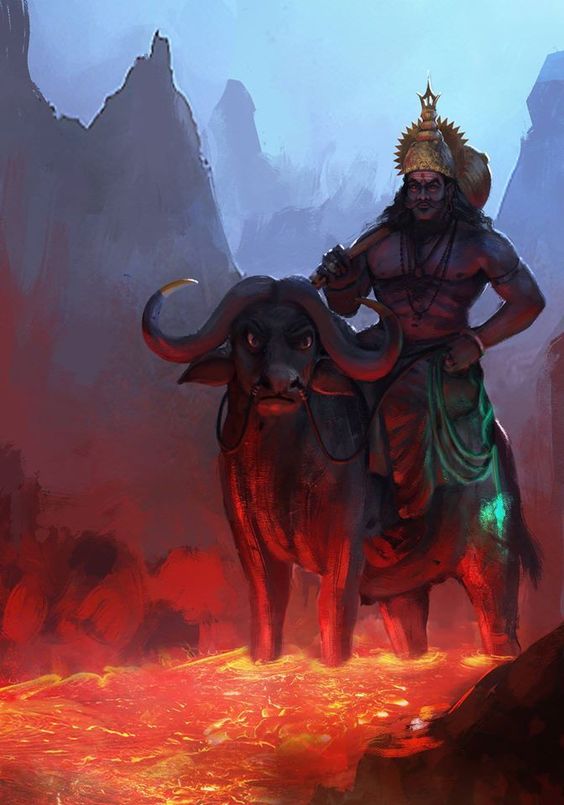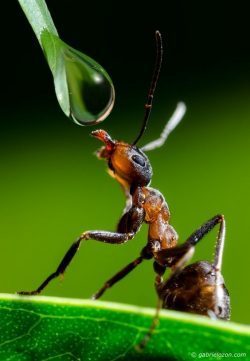“A bunch of ants came out of the darkness of their underground nest in search of food. It was early in the morning. The ants happened to pass by a plant whose leaves were covered with morning dew. ‘What are these?’ asked one of the ants, pointing to the dew-drops. ‘Where do they come from?’
Some said, ‘They come from the earth.’
Others said, ‘they come from the sea.’
Soon a quarrel broke out — there was a group who adhered to the sea theory, and a group who attached themselves to the earth theory.
Only one, a wise and intelligent ant, stood alone. He said, ‘Let us pause a moment and look around for signs, for everything has an attraction towards its source. And, as it is said, everything returns to its origin. No matter how far into the air you throw a brick it comes down to the earth. Whatever leans towards the light, must originally be of the light.’
The ants were not totally convinced yet and were about to resume their dispute, but the sun had come up and the dew-drops were leaving the leaves, rising, rising towards the sun and disappearing into it.
Everything returns to its original source, has to return to its original source. If you – understand life then you understand death also. Life is a forgetfulness of the original source, and death is again a remembrance. Life is going away from the original source, death is coming back home. Death is not ugly, death is beautiful. But death is beautiful only for those who have lived their life unhindered, uninhibited. unsuppressed. Death is beautiful only for those who have lived their life beautifully, who have not been afraid to live, who have been courageous enough to live — who loved, who danced, who celebrated.
Death becomes the ultimate celebration if your life is a celebration. Let me tell you in this way: whatsoever your life was, death reveals it. If you have been miserable in life, death reveals misery. Death is a great revealer. If you have been happy in your life, death reveals happiness. If you have lived only a life of physical comfort and physical pleasure, then of course, death is going to be very uncomfortable and very unpleasant, because the body has to be left. The body is just a temporary abode, a shrine in which we stay for the night and leave in the morning. It is not your permanent abode, it is not your home.
If you have known anything of the transcendental in you, death will reveal to you the transcendental in the universe — then death is no longer a death but a meeting with God, a date with God.
So you can find three expressions about death in the history of human mind.
One expression is of the ordinary man who lives attached to his body, who has never known anything greater than the pleasure of food or sex, who has enjoyed food, has enjoyed sex, whose life has been very primitive, whose life has been very gross, who has lived in the porch of his palace, never entered it, and who had been thinking that this is all life is. At the moment of death he will try to cling. He will resist death, he will fight death. Death will come as the enemy.

Hence, all over the world, in all societies, death is depicted as dark, as devilish. In India they say that the messenger of death is very ugly — dark, black — and he comes sitting on a very big ugly buffalo. This is the ordinary attitude. These people have missed, they have not been able to know all the dimensions of life. They have not been able to touch the depths of life and they have not been able to fly to the height of life. They missed the plenitude, they missed the benediction.
Then there is a second type of expression. Poets, philosophers, have sometimes said that death is nothing bad, death is nothing evil, it is just restful — a great rest, like sleep. This is better than the first. At least these people have known something beyond the body, they have known something of the mind. They have not had only food and sex, their whole life has not been only in eating and reproducing. If you have lived a little higher than the body, if you have loved music and poetry, and you have loved, and you have looked at the flowers and the stars, and something of the non-physical has entered into your consciousness, death will not be so bad, death will not be so painful. You can take it with equanimity, but still it cannot be a celebration.
They have a little sophistication of the soul, they are a little more aristocratic, more cultured. They say death is like great rest; one is tired and one goes into death and rests. It is restful. But they too are far away from the truth.
If you have touched something of the transcendental in yourself, if you have entered your own nothingness at the centre — the centre of your being, where you are no more a body and no more a mind, where physical pleasures are completely left far away and mental pleasures such as music and poetry and literature and painting, everything, are left far away, you are simply, just pure awareness, consciousness — then death is going to be a great celebration, a great understanding, a great revelation.
Those who have known life in its deepest core, they say that death is God. It is not only a rest but a resurrection, a new life, a new beginning; a new door opens.
When a Sufi mystic, Bayazid, was dying, people who had gathered around him – his disciples — were suddenly surprised, because when the last moment came his face became radiant, powerfully radiant. It had a beautiful aura.
Bayazid was a beautiful man, and his disciples had always felt an aura around him, but they had not known anything like this; so radiant.
They asked, ‘Master Bayazid, tell us what has happened to you. What is happening to you? Before you leave us, give us your last message.’
He opened his eyes and he said, ‘God is welcoming me. I am going into his embrace. Goodbye.’
He closed his eyes, his breathing stopped. But at the moment his breathing stopped there was an explosion of light, the room became full of light, and then it disappeared.
When a person has known the transcendental in himself, death is nothing but another face of God. Then death has a dance to it. And unless you become capable of celebrating death itself, remember, you have missed life. The whole life is a preparation for this ultimate.
Osho: The Art of Dying Chapter #1 Chapter title: The Art of Dying (Excerpts)
कौन कहता है कि मौत आई तो मर जाऊँगा ?
मैं तो दरिया हूँ समुंदर में उतर जाऊँगा ………………….अहमद नदीम क़ासमी
kaun kahtā hai ki maut aa.ī to mar jā.ūñgā ?
maiñ to dariyā huuñ samundar meñ utar jā.ūñgā …………………AHMAD NADEEM QASMI
Who says I will die when I face death?
I am a river, will merge in the ocean.
Enjoy this romantic and soulful ghazal by Talat Aziz from the film “Umrao Jaan” (1981). https://www.youtube.com/watch?v=0Zhd9Y69aDo


Beautiful depiction of the ultimate truth.
Well written, Rajiv.
Very deep thoughts!!
One word… *Classic*
Reading this enhances our awareness and feel yes I am ready to enjoy anything that is coming and be it the ultimate Radiance ! Amin !
Life of 100 years (maximum) is not even a spark in the eternity….As Lord Krsna says in Bhagwat Gita that Arjun you and I have taken many births, you don’t remember them but I do remember them all…. we all have been changing bodies since time immemorial, the time we come out from one body and enter into another based on our karam and desires, this material nature awards us the body accordingly…
Nice article:-)
Great and thought provoking as always. The stories make your blogs so relatable. Today’s story about the dew evaporating left me thinking
Very well explained ultimate truth.
Beautiful articulation, as always !
But let me add another perspective….
While the aforesaid is a good way to interpret beauty in death – the transcendental way, ironically it is also the exact way adopted by extreme radicals to motivate the suicide bombers and terrorist cadres before an attack – they believe, and then rejoice in what happens of them – strange but fact !
Nice read when you are undertaking life journey gracefully. Thanks
Good insight as always. However, beg to differ on the point where the incidence of death is akin to the way life has been lived. Have seen blissful personalities pass away in tragic circumstances.
Hello Rajiv, Excellent story, as always, starting from the ants observing the dew drops, winding through the reality of life, from being unhappy or happy or spiritual, as a lifestyle!